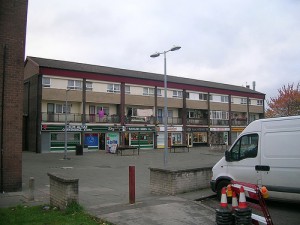Social tenants hit by rent hikes
Article published: Wednesday, February 22nd 2012
Manchester’s council tenants face an inflation-busting 6.48 per cent rent hike from April, according to plans signed off by Town Hall chiefs last week. Social tenants across the country face even steeper rises, as the government slashes welfare and pushes through housing reforms.
The increase will hit the 17,000 homes managed by the council and its housing agency Northwards, leaving all those not in receipt of housing benefit forking out an extra £4.12 each week on average. Service charges and garage costs are also set to go up by the same amount, although bills for communal heaters on “commercial contracts” will go down by 10 per cent following an 18 per cent hike last October.
Planned housing benefit cuts for people deemed to be ‘under occupying’ their homes are estimated by the council to take another £8 million each year from 14,000 social housing tenants in Manchester, amounting to between £8 – £14 lost per week for people with one spare room. Still further cuts are promised with government proposals to slash council tax benefit for those under retirement age in 2013.
As pensioners are protected from the planned 10 per cent savings in the total council tax benefit bill, working age adults are likely to take on the entire brunt of an average 16 per cent cut in their support, according to the House of Commons Scrutiny Unit. 77,000 people in Manchester alone claim the benefit, and the combined impact of welfare cuts on private renters has prompted the housing charity Shelter to warn that South Central Manchester, which includes areas such as Moss Side and Hulme which have been subject to significant regeneration attempts, will become “very unaffordable” by 2014.
Residents’ groups have reacted with anger at social rent hikes across the country of up to 8 per cent or more, with Jimmy Devlin, chair of the regional residents’ group NWTRA, lambasting the “proposed huge, above inflation rent rises across the North West”. He further singled out “draconian” welfare reforms, warning that “even those in poorly paid full time employment may well struggle to survive”.
Councillor Jeff Smith, Manchester City Council executive member for finance, said the level of government welfare changes were “unprecedented”. Smith alluded to the fact that the council’s efforts were likely to have only a very limited impact given the scale of the changes to welfare, saying “while the council will do what it can to help, we have to recognise that the majority of these changes will have a detrimental impact on those residents who receive benefits to support their living expenses.”
“Unprecedented” changes
Although the council has some discretion to set its own rents, the government’s housing financing system expects local authorities to increase rents in line with national “convergence” policies effectively intended to raise the cost of council homes up to that of Housing Associations by 2016. A Manchester City Council spokesperson said “any decision not to increase rents on this basis would leave a hole in our Housing Revenue Account.”
New rules from April will see the Housing Revenue Account – a national fund into which all council house rents are paid – split up so that each council runs its own ‘self financed’ fund. Councils are expected to use the fund for expenses such as maintenance, clearance of ‘historic’ debt from past council house building, and payments over the next two or three decades for controversial Private Finance Initiative (PFI) contracts for renovation and new home investment. PFI payments will see the council pay just under £20 million to private companies next year, rising to almost £28 million by 2014/15.
Some support to people struggling with rent or council tax is available through the council’s ‘discretionary housing payment fund’, worth just over £720,000 in 2012/13. Although the government has recently bumped up funding for the payments, a council spokesperson acknowledged that “the total available is nowhere near the amount cut from the benefits paid”.
Devlin denounced the government reforms for placing “the entire burden on the poorest in society to pay off the historic council housing debt”, and claimed the rent increases would cause “ghettoisation of the poor” as people were forced out of increasingly expensive areas.
“We run the risk of increased poverty, of immobile communities isolated by income, alienated from the mainstream of society,” he said. “This benefits nobody and civil unrest must be avoided not triggered, we believe the Coalition must think again before it’s too late.”
Richard Goulding
Manchester Mule are currently looking for new editors – check out the blog post here for details
More: Council, Cuts, Manchester, News, Welfare
Comments
No comments found
The comments are closed.




